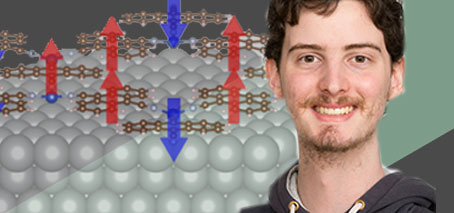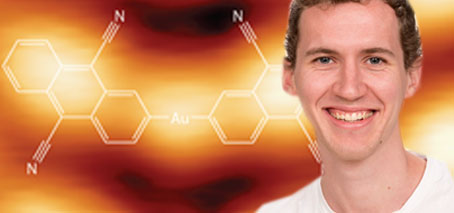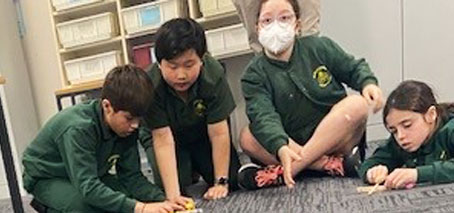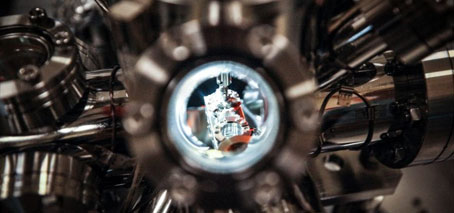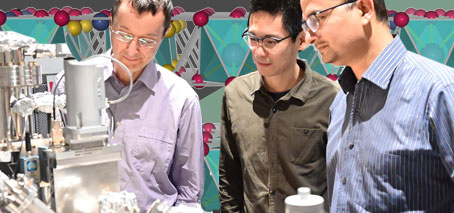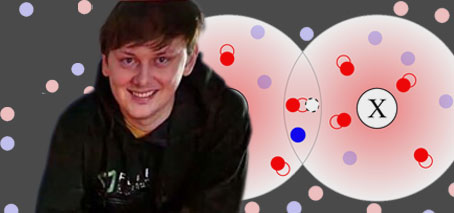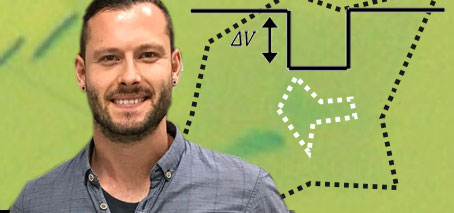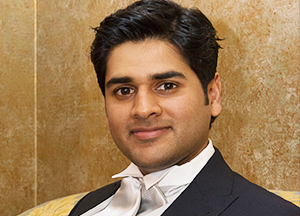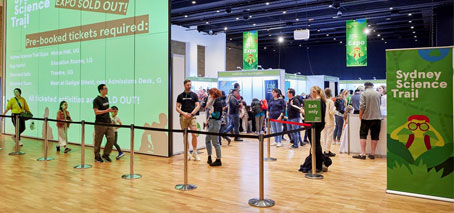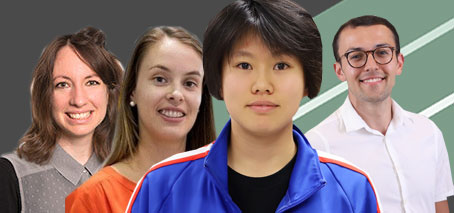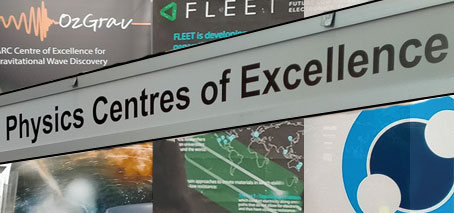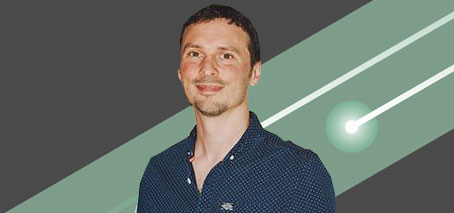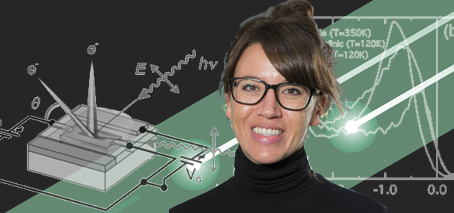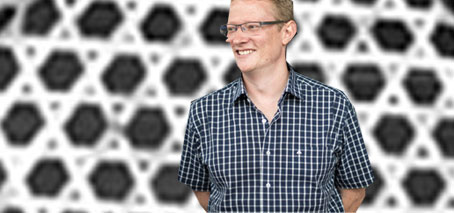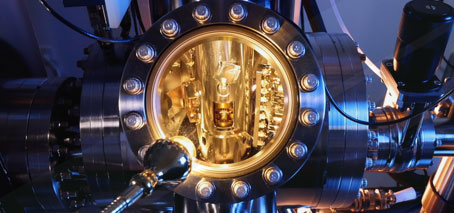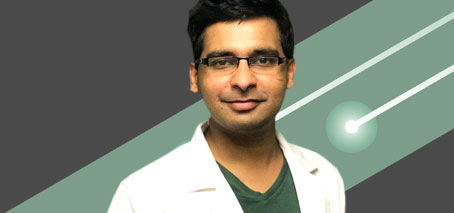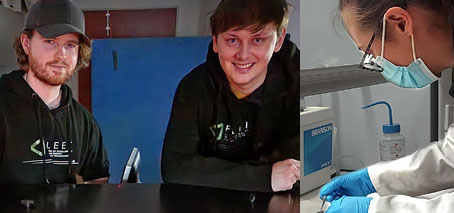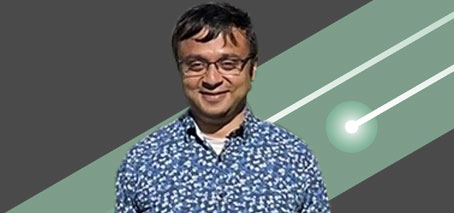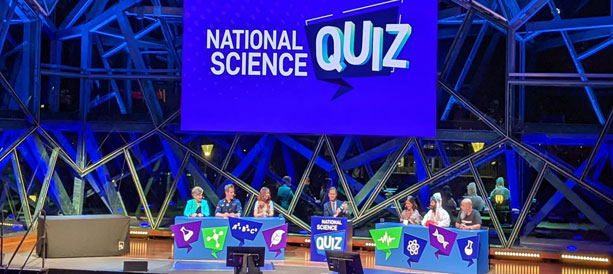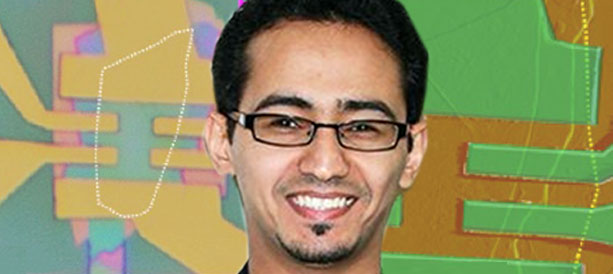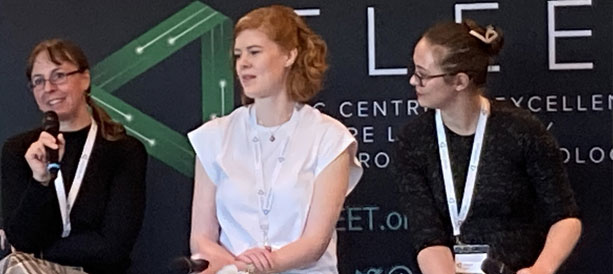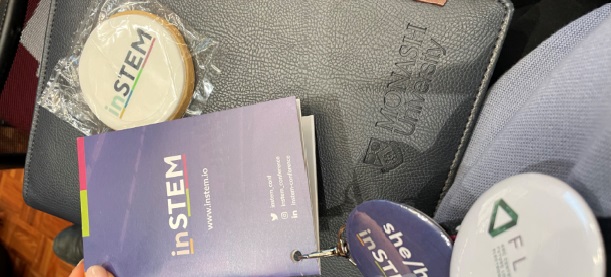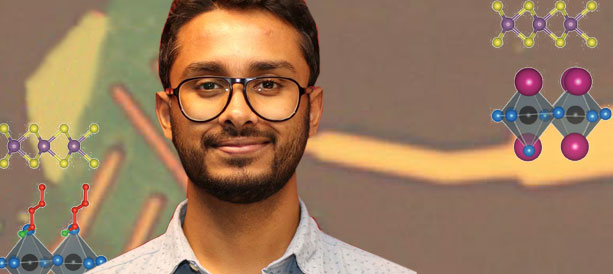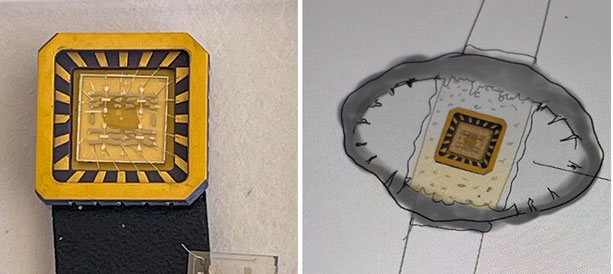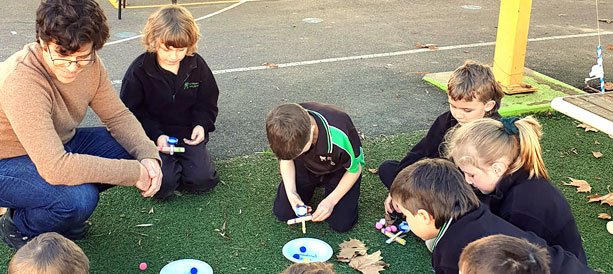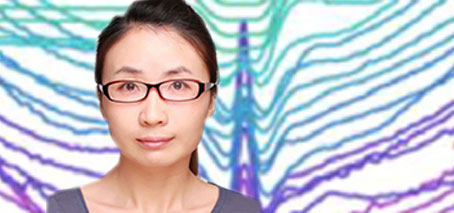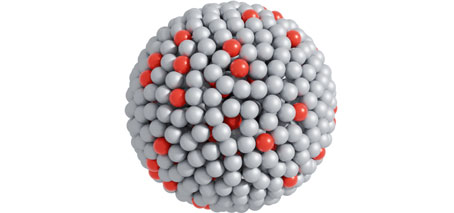How substrates influence magnetism in 2D materials Interaction-induced magnetism in metal-organic frameworks on substrates A new study at Monash University illustrates how substrates affect strong electronic interactions in two-dimensional metal-organic frameworks. Materials with strong electronic interactions can have applications in energy-efficient electronics. When these materials are placed on a substrate, their electronic properties are changed by charge transfer, strain, and …
A chemical reaction as good as gold
Gold may hold the key to unlocking an elusive but highly desirable reaction pathway. A new Australian-led stud finds gold atoms could be key to unlocking organic reactions. Organic molecules are the building blocks for materials we use every day – from our clothes and coffee cups to the screen displays of our phones. Controlling reactions of these organic molecules …
Submission to the National Quantum Strategy: proposed framework
FLEET has made the following submission towards the proposed framework of Australia’s National Quantum Strategy. See Consultation Paper. The ARC Centre of Excellence in Future Low-Energy Electronics Technologies (FLEET; fleet.org.au) is a collaboration between Monash University, Australian National University, University of New South Wales, University of Queensland, RMIT, Swinburne University of Technology, and University of Wollongong, comprising around 200 leading …
Boom! Watch out below. FLEET take their energy and forces workshop to Hughesdale Primary School
By using and modifying catapults made from icy pole sticks and rubber bands, 270 primary students from Hughesdale Primary school learned about forces and energy and thought critically about FLEET’s research and why we are trying to develop energy efficient electronics. FLEET developed the Forces and energy workshop for Years 4-7 based on pilot workshops run with primary schools in …
Electron Liquids on the Cutting Edge
FLEET Investigator A/Prof Bent Weber, and his team at NTU Singapore, have demonstrated unprecedented control of a one-dimensional flow of electrons in a rare quantum state that physicists have sought to understand for over half a century. The technique suggests a path to more-robust and more-accurate quantum computers. From: Nanyang Technical University, Singapore As you walk in a crowded shopping …
A new era of two-dimensional ferroelectrics
A UNSW/Flinders University paper published recently in Nature Reviews Materials presents an exciting overview of the emerging field of 2D ferroelectric materials with layered van-der-Waals crystal structures: a novel class of low-dimensional materials that is highly interesting for future nanoelectronics. Future applications include ultra-low energy electronics, high-performance, non-volatile data-storage, high-response optoelectronics, and flexible (energy-harvesting or wearable) electronics. Structurally different from …
A drop in the sea of electrons: Understanding Fermi polarons and their interactions
Multidimensional coherent spectroscopy (MDCS) on monolayer WS2 reveals Fermi polaron interactions Phase-space filling drives new optical selection rules, where excitons compete for the same electron Identification of a novel, cooperatively-bound exciton-exciton-electron state Recent Australian-led research has provided a world’s first measurement of interactions between Fermi polarons in an atomically-thin 2D semiconductor, using ultrafast spectroscopy capable of probing complex quantum materials. …
Trapping polaritons in an engineered quantum box
High exciton-polariton density in an engineered quantum box Possible pathway to future, ultra energy-efficient technologies Australian researchers have engineered a quantum box for polaritons in a two-dimensional material, achieving large polariton densities and a partially ‘coherent’ quantum state. New insights coming from the novel technique could allow researchers to access striking ‘collective’ quantum phenomena in this material family, and enable …
New Chief Investigator Priyank Kumar
Congratulations to Priyank Kumar at the School of Chemical Engineering, UNSW Sydney, who becomes a new Chief Investigator within FLEET. “I look forward to contributing to the objectives of FLEET through both fundamental and translational research,” said Priyank. “I would like to thank Michael Fuhrer, Kourosh Kalantar-zadeh and the FLEET team for providing me this opportunity.” Priyank has been an …
Captivating physics and our digital society—Sydney Science Trail
More than 1000 high-school and primary students, and another 1100 members of the public were introduced to FLEET’s research and the counterintuitive world of quantum physics at Sydney Science Trail in July, in FLEET’s largest post-pandemic outreach event to date. FLEET UNSW members were among the 20+ science orgs presenting at Sydney Science Trail, based at Australian Museum as part …
Four new Research Fellows: increasing our team’s strengths with diversity
FLEET welcomes four new research fellows, working in disparate roles across the Centre and all contributing to the improved diversity that makes the Centre greater than the sum of its parts: Dr Emma Laird (UQ) Dr Yonatan Ashlea Alava (UNSW) Dr Mengting Zhao (Monash) Dr Grace Causer (Monash) The four new fellows were successful candidates among 35 applicants for the …
Critical Technologies submission
FLEET has made the following submission towards a review of Australia’s ‘critical technologies’, ie current and emerging technologies critical for Australia today (or could become critical within the next 10 years), aimed at giving Australia a clear competitive advantage, accelerating productivity growth, and creating well-paying jobs. The ARC Centre of Excellence in Future Low-Energy Electronics Technologies (FLEET; FLEET.org.au) is a collaboration between …
Teaching the teachers at CONASTA
FLEET has joined forces with two other ARC Centres of Excellence, Exciton Science and Ozgrav, at the 2022 Australian Science Teacher Conference (CONASTA) to engage primary and secondary educators about their research and educational resources. FLEET’s Senior Outreach Coordinator Jason Major conducted a professional development workshop at the event that informed and provided primary-early secondary teachers with the confidence to …
Congratulations A/Prof Jesper Levinsen
Congratulations to FLEET’s Jesper Levinsen, whose work has been recognised by the Monash University Faculty of Science, as he is promoted to Associate Professor. FLEET Associate Investigator Jesper Levinsen is a theoretical physicist researching strongly-interacting quantum systems at the interface between condensed matter physics and the physics of ultracold atomic gases in the Monash School of Physics and Astronomy. “I …
Julie Karel recognised for excellence in research and science outreach
Congratulations to FLEET’s Dr Julie Karel (Monash), receiving a Victorian 2022 Young Tall Poppy Science Award, recognising her research in functional amorphous materials for future ultra-low energy electronics, and in science outreach. The Young Tall Poppy awards, an initiative of the Australian Institute of Policy and Science, recognise excellence in research as well as enthusiasm for communicating science beyond the …
Future Fellowship Mark Edmonds
Kagome metals: From Japanese basket to next generation electronic devices FLEET AI Dr Mark Edmonds received an ARC Future Fellowship in this week’s announcement by the Minister. The new ARC Fellowship will support Mark’s work investigating a new type of 2D material that is very promising for faster, more energy-efficient future electronic devices. ‘Kagome’ metals have a topological non-trivial nature …
Automation takes the misery out of scanning microscopy: FLEET Translation Program
FLEET Translation Program funding to automate the ‘boring parts’ of STM experiments, freeing up operators’ time Monash PhD candidate Julian Ceddia has been awarded funding from the first round of the FLEET Translation Program to further develop the automation of Scanning Tunnelling Microscopes (STMs), based on previous work from the group of his supervisor, Agustin Schiffrin. STMs are capable of …
New FLEET Industry Relations Chair
FLEET is very pleased to report that Centre AI, Sumeet Walia at RMIT has been nominated by the FLEET Executive Committee to chair our Industry Relations Committee from Aug 2022, and has agreed to take on the position. The Centre Exec and Ops Team would like to thank Torben Daeneke for his leadership in the past two years as Chair …
What you see is what you get with pre-characterised TMDs: FLEET Translation Program
First project approved for FLEET Translation Program funding PhD candidates Mitch Conway, Abby Goff, and Jack Muir have recently been awarded $31,000 in FLEET’s first round of funding from the FLEET Translation Program (FTP). Their cross-node collaboration between Swinburne and RMIT aims to create a catalogue of high quality 2D materials, namely transition metal dichalcogenides (TMDs) and their heterostructures. …
Congratulations Nikhil Medhekar
Congratulations to FLEET CI Nikhil Medhekar at Monash University, who has been promoted to full Professor of Materials Science and Engineering. Nikhil’s Computational Materials Lab at Monash University Faculty of Engineering Department of Materials Science and Engineering investigates the physics and mechanics of nanoscale materials for optoelectronic, energy and structural applications using a broad range of computational tools, including: First principles …
National Science Quiz
Over 200 in-person audience members and more than 400 online contestants competed in this month’s National Science Quiz, co-presented by FLEET with a collaboration of nine research organisations. Return host ABC TV and radio presenter Charlie Pickering, who has hosted each NSQ since the inaugural edition in 2017, chaired two competing teams, comprising: Astrophysicist Kirsten Banks (UNSW) Meteorologist Nate Byrne …
Manipulating interlayer magnetic coupling in van der Waals heterostructures
Electrical control of exchange bias effect in FePS3-Fe5GeTe2 van der Waals heterostructures via proton intercalations A RMIT-led international collaboration published this week has observed, for the first time, electric gate-controlled exchange-bias effect in van der Waals (vdW) heterostructures, offering a promising platform for future energy-efficient, beyond-CMOS electronics. The exchange-bias (EB) effect, which originates from interlayer magnetic coupling, has played a …
ECR working group deliver at FLEET 2022
FLEET early career researchers and students are taking charge of their professional training and development. For the 2022 FLEET Annual Workshop this month in Wollongong, the working group delivered a range of research development training sessions and created opportunities for their peers to think about future career prospects. FLEET2022 ECR development delivered following the Centre’s three-day annual workshop included: The …
inSTEM conference: towards a more diverse science community
The inSTEM conference held in Brisbane 20-21 July, was a networking and career-development conference for people from marginalised or underrepresented groups in STEM, and their allies. The 2022 inSTEM was a partnership of ARC Centres of Excellence, industry transformation training centre and Australian Defence, recognising the wide recognition of improving diversity to research organisations in Australia. “I felt empowered by …
The hetero-interface is the device: a computational approach
Designing hetero-interfaces towards new optoelectronic functionalities using large-scale computations Assembling ‘Lego-like’ 2D ‘heterostructures’ can give rise to emergent properties and functionalities very different from the intrinsic characteristics of the constituents. Density functional theory (DFT)-based band-structure calculations can shed light on interfacial properties of different heterostructures. Interface properties of 2D perovskite/TMD heterostructures Heterostructures based on different 2D materials have resulted in …
Brilliant alternative uses for diamond showcased in concept jewellery
QUT/FLEET researcher A/Prof Dongchen Qi has joined forces with an Australian jewellery designer to showcase the brilliance of diamond in medical, scientific, and other applications. Diamond does not naturally conduct electricity, but Professor Qi, from the QUT Centre of Material Science, led research to make it both conductive and controllable as a high-capacity semiconductor. Semiconductors conduct or insulate electrical signals …
FLEET’s engagement with rural schools continues
Following on from FLEET’s previous trip to the western districts in May, Centre outreach coordinator Jason Major and COO Tich-Lam Nguyen visited Horsham College north of the Grampians to engage year 7 students and pilot-test FLEET’s Forces and Energy workshop. The budding scientists (all 170 of them) built catapults and balloon rockets to explore Newton’s 2nd and 3rd laws and …
Topological superconductors: fertile ground for elusive Majorana particle
Majorana fermions promise information technology with zero resistance A new, multi-node FLEET review investigates the search for Majorana fermions in iron-based superconductors. The elusive Majorana fermion, or ‘angel particle’ proposed by Ettore Majorana in 1937, simultaneously behaves like a particle and an antiparticle – and surprisingly remains stable rather than being self-destructive. Majorana fermions promise information and communications technology with …
Liquid platinum at room temperature: The ‘cool’ catalyst for a sustainable revolution in industrial chemistry
In an Exciton Science/FLEET study, researchers have been able to use trace amounts of liquid platinum to create cheap and highly efficient chemical reactions at low temperatures, opening a pathway to dramatic emissions reductions in crucial industries. When combined with liquid gallium, the amounts of platinum required are small enough to significantly extend the earth’s reserves of this valuable metal, …
A local trifecta of semiconductor physics in June/July
Semiconductor physics conference, satellite symposium and FLEET workshop It is a wonderful opportunity for Australia’s semiconductor physics community, as Sydney hosts the International Conference on the Physics of Semiconductors (ICPS22, 27-30 June), the premier forum for new semiconductor physics. Nobel Laureates Prof Klaus von Klitzing (Quantum Hall Effect) and Prof Kostya Novoselov (graphene) join an impressive array of 60 international …

